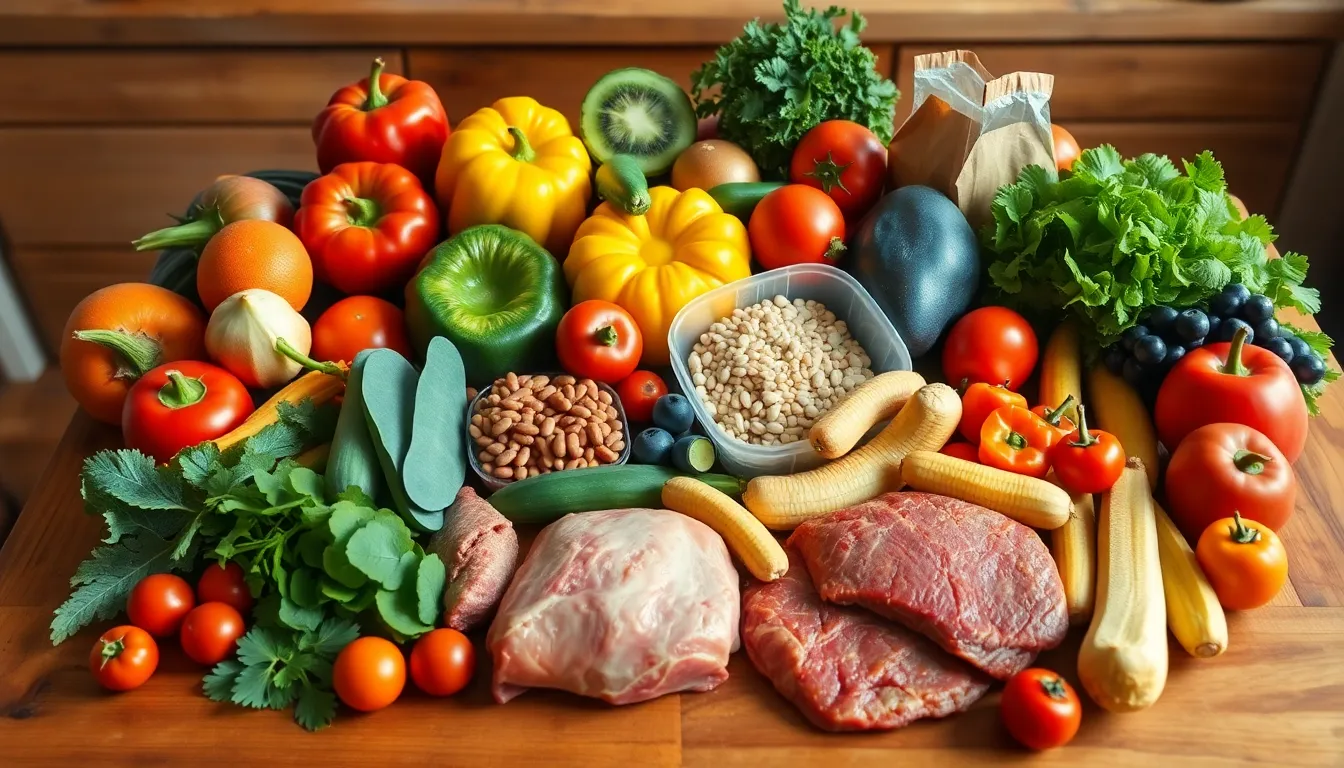Table of Contents
ToggleWhen it comes to kids and nutrition, parents often feel like they’re navigating a culinary minefield. One minute, it’s all about broccoli and quinoa, and the next, it’s a fierce battle over a plate of peas. But fear not! With the right approach, healthy eating can be as fun as a game of hide-and-seek.
Imagine a world where kids actually beg for carrots instead of candy. It’s possible! By introducing colorful, tasty, and nutritious foods, parents can turn mealtime into an adventure. Not only do these foods fuel growing bodies, but they also spark creativity and joy. So buckle up as we dive into the delicious realm of kid-friendly nutrition that’ll have them saying “yes, please!” to healthy choices.
Importance Of Nutrition Food For Kids
Nutrition plays a vital role in a child’s overall health and growth. Proper nutrition fuels daily activities and supports long-term development.
Physical Development
Healthy foods significantly contribute to a child’s physical development. Nutrient-rich options like fruits, vegetables, whole grains, and lean proteins promote growth. Vitamins and minerals found in these foods support strong bones and muscles. A balanced diet also improves immune function, helping children resist illnesses. Parents can encourage active lifestyles by providing nutritious snacks and meals, which foster energy and stamina. Incorporating variety ensures children receive essential nutrients necessary for optimal development.
Cognitive Development
Nutritious foods are crucial for cognitive development in children. Foods rich in omega-3 fatty acids, such as fish and walnuts, enhance brain function and memory. Consuming whole grains provides essential glucose that fuels brain activity. Iron-rich foods, like lentils and spinach, support learning by improving concentration and attention. Incorporating foods high in antioxidants, such as berries, protects the brain from oxidative stress. Parents play a key role by offering diverse, healthy meals to stimulate cognitive growth and learning.
Key Nutrients Essential For Kids

Essential nutrients fuel children’s growth and development. A proper balance of nutrients supports their physical and cognitive needs.
Proteins
Proteins play a crucial role in building and repairing tissues. Their contribution to muscle growth influences physical strength and overall development. Foods such as lean meats, fish, eggs, beans, and nuts serve as excellent protein sources. Incorporating various proteins into meals ensures children receive the necessary amino acids. These compounds aid in hormone production and immune function, fostering a strong defense against illnesses.
Vitamins and Minerals
Vitamins and minerals offer indispensable support for overall health. Nutrients such as vitamin C and iron significantly enhance immune system function and cognitive abilities. Fruits, vegetables, whole grains, and dairy products contribute essential vitamins and minerals. These foods help maintain strong bones and teeth while promoting optimal brain function. A diverse diet rich in nutrients directly correlates with better concentration and academic performance, making it vital for healthy growth and development.
Recommended Nutrition Food Options For Kids
Providing children with nutritious food options is vital for their growth and development. The following sections highlight key categories of food that contribute positively to their health.
Fruits and Vegetables
Fruits and vegetables play a crucial role in a child’s diet. They offer essential vitamins and minerals necessary for immune support and overall health. Berries, for example, are rich in antioxidants, while carrots provide beta-carotene for eye health. Incorporating a variety of colors, such as green spinach and red bell peppers, can make meals visually appealing and fun. Children may discover they enjoy eating rainbow-style salads or fruit skewers. Creative presentation motivates kids to try new flavors and textures.
Whole Grains
Whole grains are an important source of energy and fiber for children. Options like brown rice, whole wheat bread, and oats provide sustained energy and promote healthy digestion. Whole grains are also linked to better concentration and learning. Offering oatmeal for breakfast or whole grain pasta for dinner makes it easier for parents to integrate these healthy options into their meals. Experimenting with different grains, such as quinoa or barley, can keep meals exciting and diverse.
Dairy Products
Dairy products are crucial for bone health and development. Milk, yogurt, and cheese contain calcium and vitamin D, supporting strong bones and teeth. Many children enjoy yogurt, which can be flavored with fruits or honey for added taste. Cheese sticks serve as convenient snacks that can be packed for lunches. Opting for low-fat or non-fat options when possible can benefit their overall nutrition. Ensuring that children have daily servings of dairy supports their growth while also teaching them healthy habits.
Tips For Encouraging Healthy Eating Habits
Encouraging healthy eating habits in children involves strategic approaches that make nutritious food appealing and fun. Engaging kids in food-related activities often boosts their interest in healthy choices.
Meal Planning
Planning meals ahead allows parents to introduce a variety of nutritious options. Incorporating foods high in vitamins and minerals, like colorful fruits and vegetables, makes dishes more exciting. Involving children in the selection process gives them a sense of ownership. Allowing kids to choose a fruit or vegetable for the week creates anticipation. Preparing a weekly menu together ensures a balanced diet and can establish routines, reducing the likelihood of unhealthy snacking between meals. Rotating food choices prevents boredom while providing essential nutrients for children’s growth.
Involving Kids In Cooking
Inviting children into the kitchen turns cooking into a fun, hands-on experience. Teaching them simple tasks, like washing vegetables or stirring mixtures, enhances their skills and confidence. As kids participate, they develop a connection with their meals. Showing kids how to prepare healthy recipes creates enthusiasm. Exploring new ingredients together fosters their curiosity about flavors and textures. Utilizing kid-friendly tools, like cookie cutters, makes healthy foods visually appealing. Encouraging creativity can lead to them suggesting new recipes, further promoting healthy eating habits.
Promoting healthy eating habits in children is a rewarding journey that can lead to lifelong benefits. By introducing a variety of colorful and nutritious foods parents can create positive associations with healthy eating. Encouraging kids to explore new flavors and textures not only supports their physical growth but also enhances cognitive development.
Involving children in meal planning and preparation fosters excitement around food and builds essential life skills. As they learn to appreciate the value of nutritious meals they’re more likely to make healthier choices independently. Ultimately a balanced diet rich in essential nutrients lays the foundation for a healthier future for every child.





